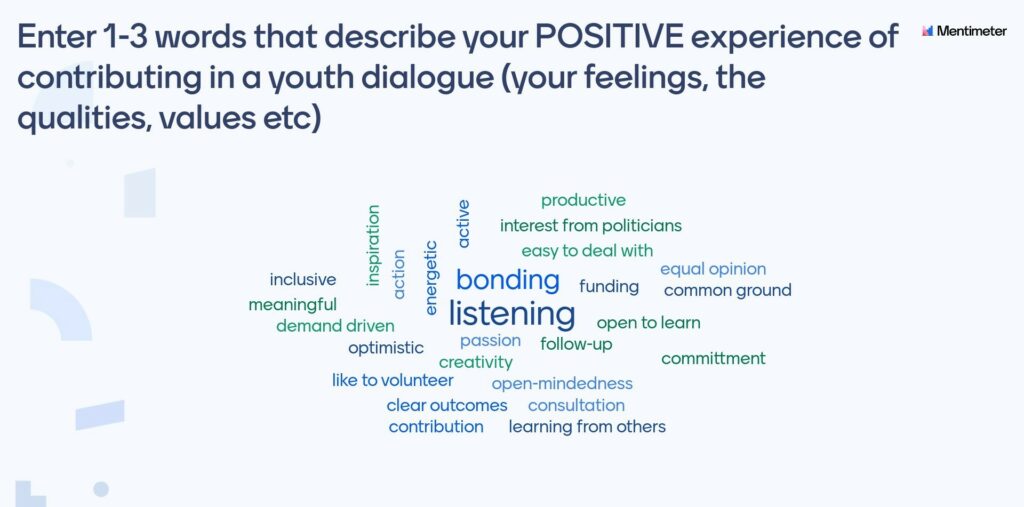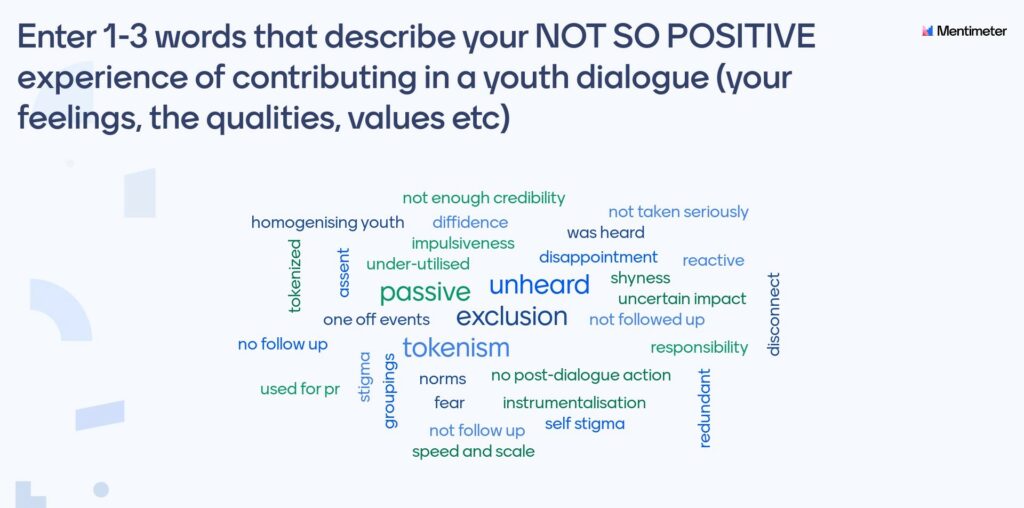by Jessica Ball and Pier Andrea Pirani
Development and humanitarian organisations increasingly want to include and act upon young people’s voices, opinions, and insights. The past five years have seen a blossoming of youth activist movements across the globe, leading to the amplification of youth voices working across the intersections of climate, environment, and social justice. At a time when young people are demanding more from global leaders, whilst trusting them less; how can organisations ensure initiatives to develop youth dialogues are inclusive, purposeful, and mutually beneficial for all involved?
To mark this year’s International Youth Day, the Dgroups Foundation with the support of KM4Dev convened an online event on “youth in dialogues”. The aim of the event was to bring together experiences where dialogue and other processes have explicitly worked with youth or tried to amplify their voices on development and humanitarian issues.
The seed of this event was planted in October 2021, during a Dgroups Foundation event on Online collaboration trends and actions for more effective international development. During the closing fishbowl at that event, Hannah Kabelka encouraged us all to have more youth representation, especially when discussing actions for future online collaboration and dialogues: a challenge that the Dgroups Foundation took on board and has been reflecting on, subsequently leading to this dialogue.
What’s the essence of positive youth dialogues?
Acknowledging the varying motivations, capacities, and intentions for bringing youth together, the event began with a short networking exercise that allowed participants to share reflections on positive and less positive experiences of when they contributed or took part in a youth dialogue or forum. The word clouds below capture these experiences and are a powerful reminder of the importance of listening, inclusion, and setting up processes that truly and genuinely want to engage youth and take on board their ideas and opinions to drive positive change.


Sharing experiences, and learning together
Our chat show guests shared their experiences and lessons learned from processes that they have led and been part of:
- Erica Di Girolami talked about the youth consultations that were organised for the XV World Forestry Congress (WFC) and led to the Work with Us: Youth Call for Action issued at the close of the Congress;
- Nawsheen Hosenally shared her personal journey and the value she got through her participation in youth activities and dialogues that were organised under the banner of the ARDYIS programme, lead by the (now closed) CTA to raise the capacity and opportunities of youth in agriculture through ICTs in ACP countries (Africa, Caribbean and Pacific);
- Woroud Albtoush shared the experience of the Share-Net International Improvement Model (SHIRIM) and the intergenerational diaologues they have conducted on the topic of “Parents-adolescent relationship in regard to Sexual Reproductive Health information and education”
You can view the recording of the chat show below.
10 points for more effective youth dialogues
Below we summarised some key points from the discussions that can guide more organisations towards equitable and meaningful dialogue with young people.
TimeWe heard this again and again during the dialogue: well designed and facilitated consultation processes take time, our speakers spoke about processes that took place over 18 months, 24 months and 10 years. | |
CommitmentCommitment needs to come from all involved – the youth taking part, and the organisations leading the consultation. Organisations supporting the consultation should be clear on what they can offer; formalise the engagement and incentivise participation. | |
Avoid stand-alone eventsOne-off events signal a lack of commitment, and may raise concerns about youth being exploited for promotional or positioning purposes. The processes we heard about wove together surveys, virtual events, consultations, competitions and knowledge products over the course of the consultation and beyond. | |
Have a clear goalIt goes without saying that we all want to feel we are making good use of our time, and adding value in the right places. Youth want to be involved in processes that will leave a legacy. All the processes we heard about resulted in tangible outcomes – a ‘youth call to action,’ knowledge product or communique. | |
Have a clear planTo achieve the clear goal you need to have a clear plan. It is important to outline and communicate the different steps of the process, how youth will be involved and how it relates to the overall organisational strategy. The plan can also become a useful tool to strengthen commitment, an example of which was shared by one speaker in the form of a ‘change package.’ | |
Incentivise participationHaving a clear goal and plan are vital incentives for participation and commitment over the process. However, consider other ways to incentivise youth – we heard how important it was to make consultations fun; to provide opportunities for mentoring, travel etc or the use of organisational platforms to amplify youth achievements and activities. | |
Support with organisational capacityMany of the initiatives we heard about received support from partner organisations in the form of translation of events; social media promotion; event design and facilitation guidance etc which were key to the success of the consultations. | |
Involve decision makersWhilst the ‘youth for youth’ approach is important, it needs to be supported by decision makers: it cannot just be a dialogue among youth. Like all new organisational approaches, it is unlikely to succeed without leadership buy-in and support. | |
Invest in facilitationOur speakers stressed the importance of having good moderation and facilitation of the consultation process and events. The role of the facilitator is to hold the space (virtual or in-person) for the participants, make it safe for them to express views, allow collaboration to occur and ensure the process is on track to meet the goals and objectives. | |
Add a personal touchUltimately all humans want to feel seen, heard and appreciated. Our speakers shared how important it is to provide a space for young people to feel free to express themselves; tha a mix of virtual and in-person events should be considered; and to always design with fun and inclusive participation in mind. |
Next steps
The learning and discussion should not stop here.
In fact, there was a clear call from participants that this should not be just a one-off event – more knowledge-sharing events like this would be welcome.
Participants also indicated they would appreciate sectoral dialogues or online discussions (e.g. youth in agriculture; youth in forestry; youth in sexual and reproductive health and rights; etc), as well as collective work on principles/guidelines on how to involve and include youth online, amplifying their voices and looking to engage into their dialogues.
Some participants indicated that they need to enhance their skills in facilitating youth dialogues.
As Dgroups Foundation, we really appreciate the contributions from the people who joined and shared their experiences.
Underlying all these conversations it seems to us, is the notion that yes, development and humanitarian organisations can do much better at engaging and listening to youth in their online efforts. But, as important, the new and next generations are ‘born’ digital and their online expectations and expertise and what grabs and motivates their attention are quite different to earlier generations raised on email, PowerPoint and, nowadays, Zoom or MS Teams.
There is space for more experimentation and capacity development as well as organisational and individual learning and adaptation that takes our dialogues in different and uncharted directions.
We, as development organisations, can better include youth and their concerns in our activities through online dialogue; we also need enhanced youth-led and focused interactions, and to support them in including earlier generations and, hopefully, helping to devise our future development toolkit for online discussion and learning.
We will take these ideas on board and work with partners to ensure that this will not be just another stand-alone event but the beginning of an inclusive process.
Please share any feedback in the comments below or by email to foundation@dgroups.info. We especially welcome offers and suggestions to take any of the ideas here, or others, forward.
Links and resources
- [Slides] About the Youth consultation and youth call to action
- [News article] XV World Forestry Congress: Young people call for more opportunities, training and political participation in the forest sector
- [File] Work with Us – Youth Call for Action XV WFC
- [Podcast] Youth call to action for intergenerational collaboration; co-creating pathways for a sustainable future with forest
- [Blogs] Category archive for WFC Korea youth declaration
- [Slides] Youth engagement in SHIRIM
- [Knowledge platform] Share-Net international
- [News article] Share-Net Jordan: Spring 2022 Activities
- [Web page] Share-Net International Rapid Improvement Model (SHIRIM)